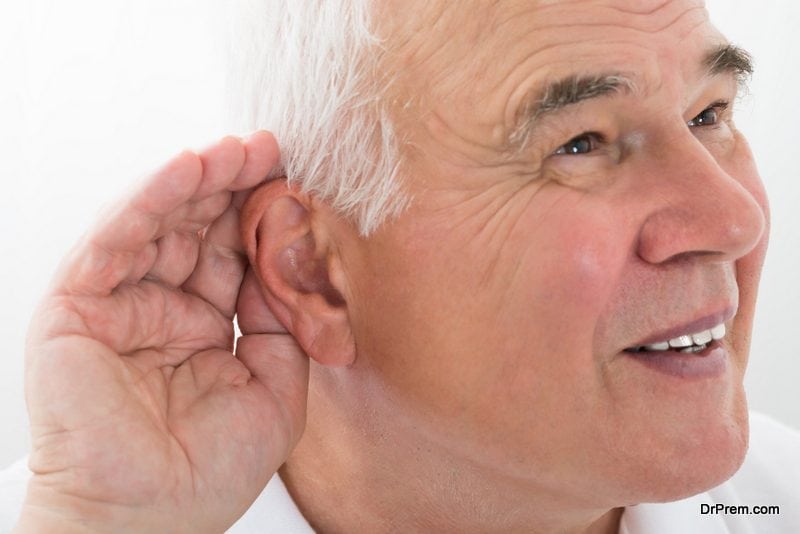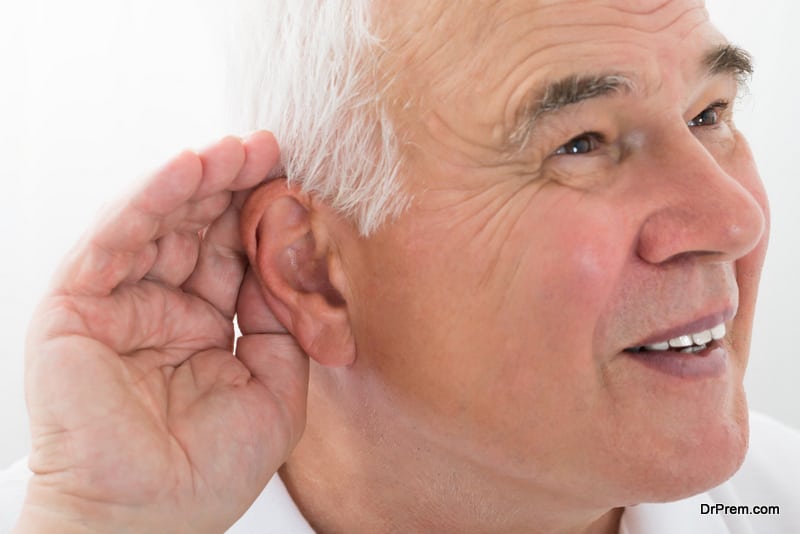Hearing loss is one condition that knows no age boundaries. It can affect infants at birth, develop with age or result from a serious injury or illness. Over 48 million individuals suffer from hearing loss in one capacity or another but the reasons can vary greatly. This article will cover some of the most common causes of hearing loss and treatment options available.
1. Excessive Noise Exposure
 Listening to loud music in the car or attending a few concerts won’t cause permanent hearing loss. But exposure to sounds over 85 decibels for an extended period of time can do permanent damage. The louder the sound, the faster the damage is done. This damage is known as noise induced hearing loss, or NIHL. This type of hearing loss can vary greatly. Some is permanent while others are temporary. Some NIHL happens immediately while others take time to develop. The good thing about NIHL is that it’s completely preventable. The most common causes of NIHL are an impulse sound like an explosion or exposure to loud sounds over an extended period of time like heavy machinery or musical acoustics. There are several ways you can prevent NIHL including:
Listening to loud music in the car or attending a few concerts won’t cause permanent hearing loss. But exposure to sounds over 85 decibels for an extended period of time can do permanent damage. The louder the sound, the faster the damage is done. This damage is known as noise induced hearing loss, or NIHL. This type of hearing loss can vary greatly. Some is permanent while others are temporary. Some NIHL happens immediately while others take time to develop. The good thing about NIHL is that it’s completely preventable. The most common causes of NIHL are an impulse sound like an explosion or exposure to loud sounds over an extended period of time like heavy machinery or musical acoustics. There are several ways you can prevent NIHL including:
- Wearing ear plugs
- Reducing the volume
- Moving away from the noise
It’s also important for responsible adults to protect the ears of younger individuals who are unable to protect it themselves.
2. Injury
Several types of injuries can cause hearing loss, both temporary and permanent. The most common injuries are concussions and traumatic brain injuries. When these injuries occur, the impact is usually violent and sudden, causing damage to the ear auditory pathway. These injuries include:
- Damage to the tissues
- Disruption of blood flow
- Ruptured eardrum
Some of these injuries are permanent while others can be corrected. Did you know that the hair cells of the inner ear can also be injured and can actually cause permanent hearing loss? That’s because the hair cells are actually what vibrate, sending electrical signals to the brain via the hearing nerve. Along with hearing loss, injuries can also cause vertigo and dizziness to some people.
3. Diabetes

Although diabetes can cause hearing loss, the reasons are somewhat unclear. Diabetes is marked by high blood sugar levels, which have also been attributed to hearing loss. It’s believed that hearing loss may be a result of nerve damage or damaged blood vessels in the ear. This type of hearing loss is often gradual and may go unnoticed for some time. There are several ways to treat this type of hearing loss including medication, removal of ear wax, or hearing aids.
4. Stroke
When someone suffers a stroke, it affects their temporal lobes, among many other things. The most common side effects of a stroke include memory loss, trouble speaking, trouble swallowing, and paralysis. But strokes can also cause temporary or permanent hearing loss. The severity of hearing loss also varies depending on what area of the brain is affected and if the stroke impacts one or both of a person’s temporal lobes. The temporal lobes are located in the brain just below your temple. When only one temporal lobe is affected by a stroke, the hearing loss is mild. But if both temporal lobes are impacted, an individual can experience complete deafness. You can learn more about single-sided deafness here.
There are actually several different conditions related to hearing loss that stroke patients may experience.
- Auditory Illusions – When individuals imagine they hear things or hear a different, distorted version of sounds
- Auditory Hallucinations – Some patients will hear sounds that aren’t actually there
- Auditory Agnosia – A person’s inability to recognize sounds or differentiate between sounds. This hearing impairment is often related to music or in-depth conversation
- Auditory Verbal Agnosia – When a person is unable to understand speech. Auditory verbal agnosia is also referred to as pure word deafness.
Hearing aids can sometimes reverse the effects of hearing loss due to stroke or at least improve and help correct some of the above mentioned conditions.
5. Age
 Like many handicaps or health complications, hearing loss is sometimes a result of old age. As a person gets older, certain parts of their body simply don’t function the way they used to and your hearing is one of those things. Age-related hearing loss, also known as presbycusis, is gradual and often happens over time. This type of hearing loss can happen as young as 65 and more commonly affects those individuals over the age of 74. Those suffering from age-related hearing loss are normally affected in both ears, equally. Physical changes occur with aging and these are what affect a person’s ability to hear. They include changes to the inner ear, middle ear or changes to the nerve pathway that connects the ear to the brain. Medications, other medical conditions, and exposure to loud noises over time can also cause hearing loss in older individuals.
Like many handicaps or health complications, hearing loss is sometimes a result of old age. As a person gets older, certain parts of their body simply don’t function the way they used to and your hearing is one of those things. Age-related hearing loss, also known as presbycusis, is gradual and often happens over time. This type of hearing loss can happen as young as 65 and more commonly affects those individuals over the age of 74. Those suffering from age-related hearing loss are normally affected in both ears, equally. Physical changes occur with aging and these are what affect a person’s ability to hear. They include changes to the inner ear, middle ear or changes to the nerve pathway that connects the ear to the brain. Medications, other medical conditions, and exposure to loud noises over time can also cause hearing loss in older individuals.
Because this type of hearing loss happens over time, people don’t always realize that they’re experiencing difficulties. Most often, a family member, friend or coworker will be the first to notice that you’re having trouble hearing them. Once this happens, it may be time to visit a specialist to determine the exact cause of your hearing loss and potential treatment options. You can visit an ENT (ear nose and throat specialist) for diagnosis. An audiologist will help determine the severity of your condition and an hearing aid specialist can perform hearing tests, counseling, and discuss the possibility of hearing aids. If you are the resident of London, you can check out this London based ear clinic or consult them for any problems or queries. Also. Rechargeable hearing aids are proving very popular today due to their power, ease of use and durability.
6. Heredity
Aside from old age, other non-medical conditions like heredity can sometimes cause hearing loss. Gene mutations and genetic factors can make some people more prone to hearing loss than others. Some causes are rare disorders where hearing loss is a side effect. These include Usher’s syndrome, Pendred syndrome, and Otosclerosis. Aside from these conditions, if there is a mutation present in the sensory hair cells of the inner ear, this can be passed on from one generation to the next, causing complications with hearing. For some unfortunate individuals, hearing loss or even deafness can occur at birth or a very young age. This is often caused by deformations in the inner ear or other hereditary conditions.
7. Shingles
 It may seem strange that a condition related to Chickenpox can actually cause hearing loss, but it’s true. This type of shingles is known as Ramsay Hunt syndrome and occurs when the outbreak of this rash affects the facial nerve near one or both of a person’s ears. Not only do sufferers experience the painful, itchy rash that accompanies shingles, but they may also experience facial paralysis and hearing loss on the side where the rash is present. Identifying and treating Ramsay Hunt syndrome is crucial to prevent any permanent damage to your facial muscles or hearing. Symptoms of this disorder include a painful rash near the affected ear, with the potential for fluid-filled blisters. Individuals will experience facial paralysis or weakness on the same side of the face. Although the rash and facial weakness often appear simultaneously, this isn’t always the case. Some individuals may experience the rash without the muscle weakness or vice versa. In some cases, the facial paralysis can be mistaken for a stroke. Other symptoms to look for include:
It may seem strange that a condition related to Chickenpox can actually cause hearing loss, but it’s true. This type of shingles is known as Ramsay Hunt syndrome and occurs when the outbreak of this rash affects the facial nerve near one or both of a person’s ears. Not only do sufferers experience the painful, itchy rash that accompanies shingles, but they may also experience facial paralysis and hearing loss on the side where the rash is present. Identifying and treating Ramsay Hunt syndrome is crucial to prevent any permanent damage to your facial muscles or hearing. Symptoms of this disorder include a painful rash near the affected ear, with the potential for fluid-filled blisters. Individuals will experience facial paralysis or weakness on the same side of the face. Although the rash and facial weakness often appear simultaneously, this isn’t always the case. Some individuals may experience the rash without the muscle weakness or vice versa. In some cases, the facial paralysis can be mistaken for a stroke. Other symptoms to look for include:
- Difficulty closing your eye on the affected side
- Dry mouth or eyes
- Pain
- Feelings of vertigo
- Ringing in the ears
- Loss of taste or change in taste buds
Ramsay Hunt syndrome is caused by the dormant Chickenpox virus and generally affects people over the age of 60. Once a child has Chickenpox, the virus can remain dormant in that person for many years. If this virus reactivates, it manifests as shingles. Shingles on the face that affect other factors like hearing and muscle weakness is known as Ramsay Hunt syndrome. There’s no real way to prevent this disease but Chickenpox vaccinations in children at a young age can help reduce your risk of ever developing this condition.
8. Obesity
Obesity causes numerous health complications including risk of diabetes, increased blood pressure, risk of stroke, heart disease, and depression. But did you know that obesity can also cause hearing loss? One side effect of obesity is high blood pressure, which can create a ringing in the ears (tinnitus). But hearing loss due to obesity is often caused by the effect excess weight has on the important hair cells of the inner ear that help send sound messages to the brain. The inner ear is also comprised of fluid-filled tubes and nerve endings.
All of these components of the ear need proper blood flow and oxygen to work efficiently and correctly. Excess weight places strain on the body’s capillaries, which control blood and oxygen flow in the body. Without these elements, your hearing can be compromised. And once the hair cells are damaged, it can cause permanent hearing loss. Obesity can also increase your chances of developing diabetes, stroke, and other health complications that are also risk factors for hearing loss.
Although some causes of hearing loss cannot be prevented, many can. Limit your exposure to excess noise that is above safe levels, see your doctor for routine hearing exams, and maintain a healthy weight and lifestyle. All of these behaviors can reduce our risk of experiencing unexpected and preventable hearing loss. If you or a loved one are diagnosed with hearing loss, make sure you compare hearing aid prices when searching for the best products for your condition.
Article Submitted By Community Writer




